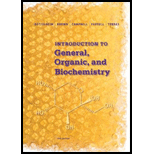
Interpretation:
The following table should be completed:
Answer to Problem 5.28P
Explanation of Solution
Given information:
Given the below table.
Concept Introduction:
The new volume, temperature or pressure of the gas at the varying temperature, pressures and volumes can be calculated using combined gas law, which states the relationship between pressure, volume and temperature of the gas.
In combined gas law, the three laws of the gas are combined. Mathematically, it is given as.
We two different sets of temperature and pressure of the gas is considered, the above equation becomes as follows:
where
One quantity can be calculated, we rest are known to us.
The unknown value for each row of information can be calculated using combined gas law.
When
We need to calculate,
When
We need to calculate,
When
We need to calculate,
When
We need to calculate,
Thus, the complete table will be as follows:
Want to see more full solutions like this?
Chapter 5 Solutions
Introduction to General, Organic and Biochemistry
- 5-34 A sample of 30.0 mL of krypton gas, Kr, is at 756 mm Hg and 25.0°C. What is the new volume if the pressure is decreased to 325 mm Hg and the temperature is decreased to-12.5°C?arrow_forward5-33 A certain quantity of helium gas is at a temperature of 27 °C and a pressure of 1.00 atm. What will the new temperature be if its volume is doubled at the same time that its pressure is decreased to one-half its original value?arrow_forward5-118 Isooctane, which has a chemical formula C8H18 is the component of gasoline from which the term octane rating derives. (a) Write the balanced chemical equation for the combustion of isooctane. (b) The density of isooctane is 0.792 g/mL. How many kg of C02 are produced each year by the annual U.S. gasoline consumption of L? (c) What is the volume in liters of this CO2 at STP? (d) The chemical formula for isooctane can be represented by (CH3)3CCH2CH(CH3)2. Draw a Lewis structure of isooctane. (e) Another molecule with the same molecular formula is octane, which can be represented by: When comparing isooctane and octane, one structure is observed to have a boiling point of 99°C, while another is known to have a boiling point Of 125°C. Which substance, isooctane or octane, is expected to have the higher boiling point? (f) Determine whether isooctane or octane is expected to have the greater vapor pressure.arrow_forward
 Introduction to General, Organic and BiochemistryChemistryISBN:9781285869759Author:Frederick A. Bettelheim, William H. Brown, Mary K. Campbell, Shawn O. Farrell, Omar TorresPublisher:Cengage Learning
Introduction to General, Organic and BiochemistryChemistryISBN:9781285869759Author:Frederick A. Bettelheim, William H. Brown, Mary K. Campbell, Shawn O. Farrell, Omar TorresPublisher:Cengage Learning Introductory Chemistry: An Active Learning Approa...ChemistryISBN:9781305079250Author:Mark S. Cracolice, Ed PetersPublisher:Cengage Learning
Introductory Chemistry: An Active Learning Approa...ChemistryISBN:9781305079250Author:Mark S. Cracolice, Ed PetersPublisher:Cengage Learning Chemistry: The Molecular ScienceChemistryISBN:9781285199047Author:John W. Moore, Conrad L. StanitskiPublisher:Cengage Learning
Chemistry: The Molecular ScienceChemistryISBN:9781285199047Author:John W. Moore, Conrad L. StanitskiPublisher:Cengage Learning Introductory Chemistry: A FoundationChemistryISBN:9781337399425Author:Steven S. Zumdahl, Donald J. DeCostePublisher:Cengage Learning
Introductory Chemistry: A FoundationChemistryISBN:9781337399425Author:Steven S. Zumdahl, Donald J. DeCostePublisher:Cengage Learning Chemistry & Chemical ReactivityChemistryISBN:9781133949640Author:John C. Kotz, Paul M. Treichel, John Townsend, David TreichelPublisher:Cengage Learning
Chemistry & Chemical ReactivityChemistryISBN:9781133949640Author:John C. Kotz, Paul M. Treichel, John Townsend, David TreichelPublisher:Cengage Learning General, Organic, and Biological ChemistryChemistryISBN:9781285853918Author:H. Stephen StokerPublisher:Cengage Learning
General, Organic, and Biological ChemistryChemistryISBN:9781285853918Author:H. Stephen StokerPublisher:Cengage Learning





